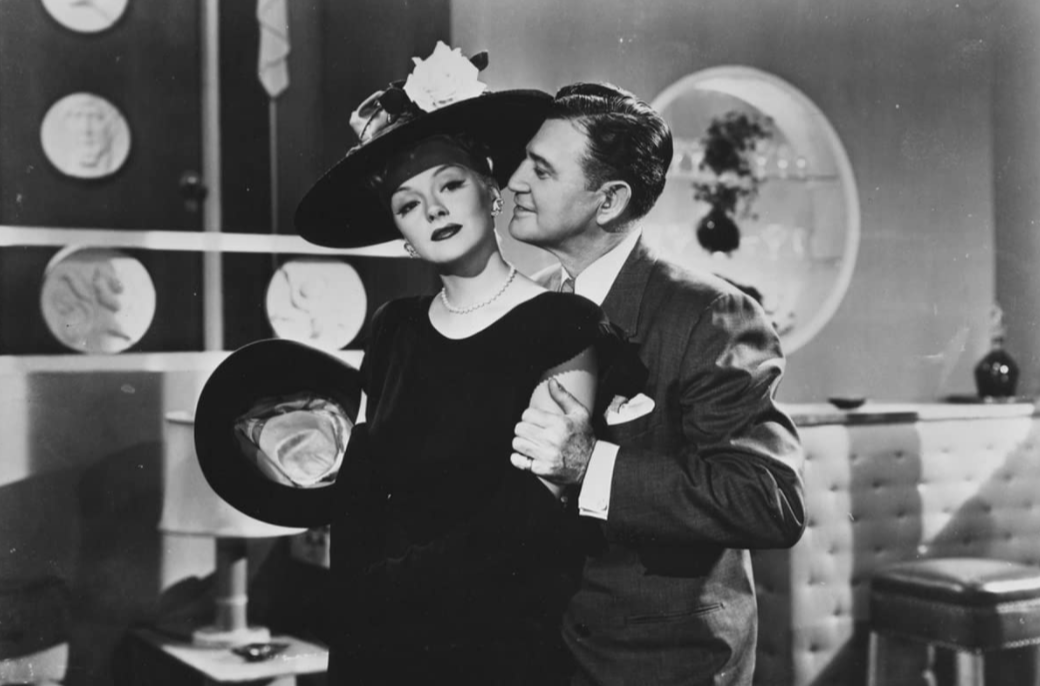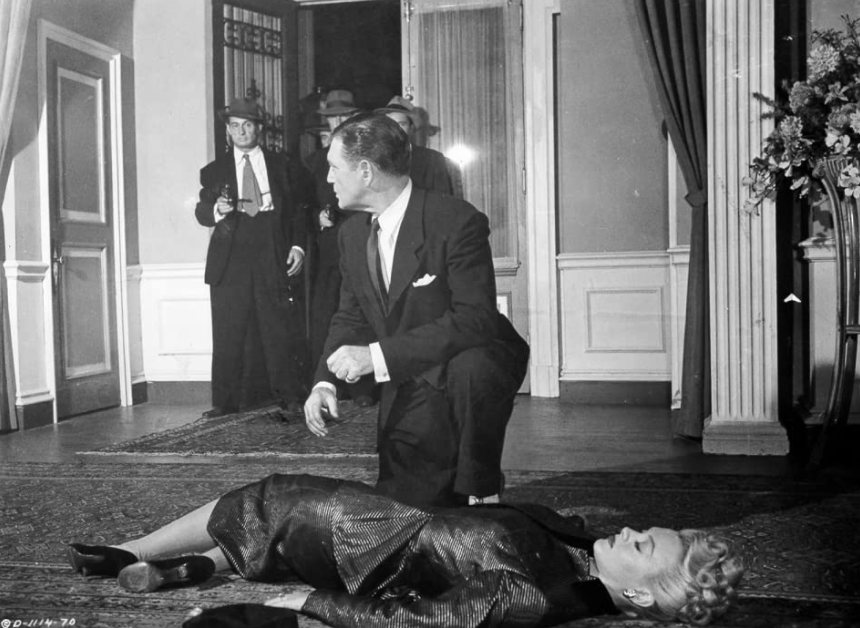The Secret of the Whistler (1946) – “…who have stepped into the shadows…”
Posted by Ivan G. Shreve, Jr. on Sep 26th 2012
In the sixth entry of Columbia’s popular Whistler film franchise—based on the CBS West Coast mystery program sponsored by Signal Oil—series star Richard Dix essays the role of Ralph Harrison, a talentless artist disdained by most of his friends. He is invariably the life of the party, however, on account of the lavish get-togethers he often throws (as one of his guests remarks: “Somebody’s got to drink his liquor and eat his food”). Harrison has the wherewithal to host such shindigs due to the largess from his wealthy wife Edith (Mary Currier), an invalid who suffers from a heart condition. Ralph is summoned to her beside during one particularly raucous affair, which sort of scotches the progress he was making with a young model named Kay Morrell (Leslie Brooks).
Edith Marie’s physician, Dr. Winthrop (Charles Trowbridge), tells Ralph that his wife’s prognosis is not good…he only gives her a few months to live. So Ralph decides to hook up with Kay—nothing serious, he just wants companionship, someone who’ll join him for dinner every once a while and be a sounding board when he’s lonely. Kay is warned away from Ralph by another artist, Jim Calhoun (Michael Duane), but she ignores him because she sees in Ralph a ride on a gravy train. What starts off as a platonic relationship between the two turns serious as Ralph falls in love…though Kay holds him at arm’s length, knowing that he’s married.

A cardiologist (Arthur Space) called in by Winthrop to treat Mrs. Harrison is just the tonic she needs; she starts to regain her strength and will to live, and one day decides to surprise her husband in his studio apartment. Hiding in another room, Edith hears Ralph and Kay enter the studio…and is positively gobsmacked to hear Ralph not only declare his love for Kay, but that he plans to tie the knot with her as soon as Edith has passed on. That night at home, Edith confronts Ralph with what she’s learned and informs him that any further communication with her should be directed through her attorney (Jack Davis)—she’s planning on divorcing Ralph, and he’ll be cut off without a penny.
So put yourself in Ralph’s place…if you knew that the money that had been flowing freely would suddenly stop, wouldn’t your thoughts entertain…murder?
Richard Dix gives one of his finest performances in The Secret of the Whistler (1946), playing a protagonist who is sympathetic…even after committing the foul deed of killing his wife. Dix’s Harrison, like most noir characters, makes the mistake of falling head over heels for a beautiful-but-mercenary dame who’s “just a bit cold around the heart,” to quote another famous noir. Kay is a real trophy; when the light hits her just right she’s strikingly beautiful, and she strings Ralph along so she can reap the benefits of his attention and the occasional bauble he throws her way. Without giving away the trademark ironic ending of the Whistler films, suffice it to say that she’ll be asked to pay the fiddler when his tune is finished.

A taut, suspenseful screenplay propels Secret beyond its B-picture origins thanks to screenwriters Richard H. Landau and Raymond L. Schrock. The cast is tops, with wonderful contributions from Dix, Brooks, Currier, and first-rate character actors like Ray Walker, Mona Barrie, Byron Foulger (in the early sequences as a mortuary director who sells Currier a tombstone that later comes back to haunt Dix), John Hamilton (from TV’s The Adventures of Superman) and as always, Otto Forest as the omnipresent narrator. Special mention should be made of Claire Du Brey’s sinister performance as Currier’s devoted housekeeper Laura…the chilling “justice is done” satisfaction on her face just before the closing credits will stay with the viewer long after the film is finished.
Journeyman George Sherman held the reins on this Whistler entry. Sherman was a Hollywood veteran whose forte was B-westerns, but occasionally broke out of his comfort zone with underrated pictures like The Sleeping City (1950) and Count Three and Pray (1955). His long friendship with John Wayne, which began when he directed the Duke in the Three Mesquiteers oaters at Republic, put him in good stead to be the producer of the actor’s 1961 The Comancheros and director of Wayne’s Big Jake (1971). George also dabbled quite a bit in television, serving as producer on such series as Daniel Boone and Gentle Ben.
The Secret of the Whistler will air this September 29th at 10:45am on Turner Classic Movies as part of the channel’s month-long scheduling of these classic programmers based on The Whistler radio program. The following Saturday (October 6th), TCM will show the final film in the Whistler series, The Return of the Whistler (1948)—an entry that does not feature Richard Dix (who retired in 1947) but does include his Secret co-star Michael Duane. (Radio Spirits will have a review next Wednesday.)

